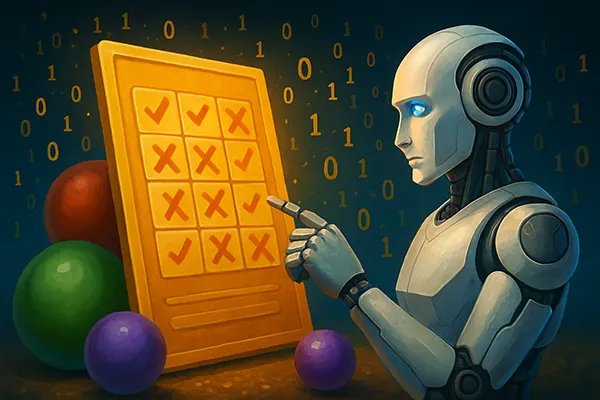
AI Algorithms in Online Lotteries: Can They Really Be Predicted?
Artificial intelligence (AI) has revolutionised many aspects of online gaming, including the lottery sector. From enhancing user experiences to strengthening security, AI algorithms are now deeply embedded in the infrastructure of modern online lotteries. However, this progress has sparked an important question: can these systems be predicted or even manipulated? Let’s delve into the technology, the myths surrounding it, and the actual implications for players and operators in 2025.
The Role of AI in Online Lotteries Today
AI is predominantly used in online lotteries for automating processes, fraud detection, and optimising user interaction. It helps platforms analyse vast datasets, predict user preferences, and improve targeted marketing. However, it’s crucial to clarify that AI does not control the actual draw mechanism in most licensed lottery systems.
The draw mechanism in regulated online lotteries typically relies on certified random number generators (RNGs), which operate independently from AI-based user interaction systems. These RNGs are subject to audits and compliance standards enforced by national regulatory bodies, ensuring their fairness and unpredictability.
That said, AI can still impact peripheral elements, such as prize structure management, bonus timing, or identifying high-risk behaviour among users. The core draw itself remains statistically immune to prediction due to its mathematical design.
Public Misconceptions About Predictability
Many players mistakenly believe that by analysing outcomes or sequences, it is possible to ‘crack’ the system. This stems from a misunderstanding of how AI and RNGs operate. AI is not used to select winning numbers — it analyses patterns of user engagement, not outcomes of the game.
Even if players employ AI tools for pattern recognition, they are analysing data that does not reflect any causal mechanism behind lottery results. Online lotteries regulated in 2025 adhere strictly to standards that prevent any possible manipulation of results, either by users or by internal systems.
In short, while AI is present in the ecosystem, its role is analytical and supportive, not decision-making when it comes to drawing numbers. Any attempts to predict future outcomes based on past data are both statistically flawed and practically futile.
Regulatory Oversight and Transparency in 2025
As of June 2025, most jurisdictions in Europe and beyond have introduced robust legal frameworks to supervise AI use in online lotteries. Authorities now require full transparency on how and where AI is implemented, especially concerning data handling and user profiling.
Licenced operators must provide documentation demonstrating that their RNGs are separate from AI systems, with audit trails available for external review. Independent auditors verify compliance and integrity of the draw process, ensuring no overlap that could raise suspicion or permit prediction.
Transparency is also a growing requirement on user interfaces, with disclaimers or notes indicating where AI may affect user experience. This empowers players to understand what aspects of the system are automated and ensures that trust in fairness remains intact.
How Regulations Protect Players
Several measures are enforced to keep the AI usage aligned with fairness and ethical standards. These include the requirement for regular third-party testing of algorithms and public access to RNG certification reports. This practice ensures the draw mechanism remains purely random and unaffected by behavioural algorithms.
Players are also protected by strict data privacy regulations, which prevent AI from using personal data to influence or predict their chances. The European GDPR framework, for example, continues to serve as a benchmark for global data protection policies in online gaming sectors.
These regulatory layers not only provide legal assurance but also shape the technological design of online lottery systems, making them inherently unpredictable and secure by design.

Advanced AI Systems and Ethical Implications
While AI cannot predict lottery outcomes, its growing sophistication in behavioural analytics has raised ethical questions. For instance, systems that identify ‘likely spenders’ or ‘potential returnees’ could be used to prompt bonus offers or notifications strategically timed to boost engagement.
In 2025, ethical frameworks are being discussed by industry groups to determine the limits of personalisation. The focus is shifting toward safeguarding vulnerable users and ensuring that AI is used to encourage responsible play rather than increase spend.
Operators are expected to provide opt-out options, clearer consent requests, and usage disclosures related to AI-based decision-making. This move towards ethical clarity aims to enhance user autonomy and trust.
AI for Responsible Gambling
One positive aspect of AI’s role is its utility in promoting responsible gambling. Machine learning models are being trained to detect early signs of compulsive behaviour, such as chasing losses, increased session frequency, or erratic betting patterns.
These systems can trigger soft interventions, such as reminders, self-assessment tools, or direct contact with support services. In many jurisdictions, these actions are now automated and mandatory as part of operator licences.
This shows that AI, when used responsibly, becomes a tool not for prediction or manipulation but for player protection and sustainable gaming environments.
